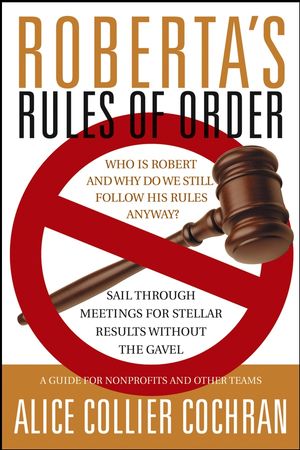Roberta's Rules of Order: Sail Through Meetings for Stellar Results Without the GavelISBN: 978-0-7879-6423-8
Paperback
336 pages
February 2004, Jossey-Bass
 This is a Print-on-Demand title. It will be printed specifically to fill your order. Please allow an additional 10-15 days delivery time. The book is not returnable.
|
||||||
Anyone who has ever participated in nonprofit board meetings that were governed by Robert's Rules of Order will not be surprised to learn of the military background of its author: U.S. Army General Henry M. Robert. The rules make a good deal of sense to those who love rigid structure, and rules, rules, rules. After sitting on nonprofit boards and serving as legal counsel to nonprofit organizations for more than two decades, I have come to loathe Robert's Rules of Order. I've seen how these rules often stifle meaningful dialog and problem-solving by giving advantage to some while relegating others to the sidelines. Indeed, they rarely coax a full contribution from those who are naturally quiet and thoughtful, or who hold back because of a lack of standing in society and/or within the board itself. It is this latter failing that cuts against the grain of our sector--a sector that so obviously values, and draws strength from, full participation from those of diverse views.
Thus it was with great interest that I learned of the book provocatively titled Roberta's Rules of Order, by Alice Collier Cochran. I was so taken by the book that I spent a half-hour or so on the phone with its engaging author, talking about her motivation for writing the book, what she wanted to accomplish with it, and so on. You can listen to our discussion, part of the CharityChannel WE INTERVIEW series, at http://charitychannel.com/weinterview/archive/021.htm.
Cochran succeeds in what she sets out to do: Provide a less formal, more feminine, and flexible approach. She replaces formality with informality; strict rules with guidelines and agreements; parliamentary procedure with democratic principles and processes; language of the 1800s with that of today; military terminology with civilian terminology; one-size fits all with flexibility, by culture; a framework designed for English and European males with that for a pluralistic society; win-lose voting with win-win decisions; a decision between two choices with straw polls and multiple choices; highly controlled and constrained meetings with those that are relaxed; and complicated with simple. I've saved perhaps the two greatest contributions for special mention: Roberta's Rules of Order replaces debate with dialog, and she puts the motion AFTER a discussion of the problem and its solution, where it belongs.
While the author wants us to know that the concepts and processes she presents are not new--she gives ample credit where it is due--she should have no reluctance to take credit for putting it all together into a very well-written, easy-to-understand, fast-reading book. She uses a sailing metaphor to good advantage throughout.
I do not overstate it when I say that this book is perhaps one of the most important contributions to the third sector I have seen. If board meetings could really become warm, easy, productive and effective, imagine how that would strengthen the organization! I intend to put it into the hands of board members on every board I serve on or advise.



